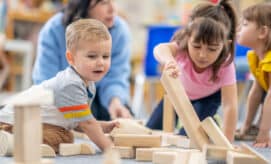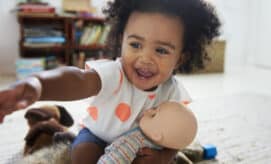How much consideration do you give to the toys you offer to the children in your care? Do you consider how the toys might affect behavior or development? Do you wonder how many toys you should offer? Research suggests that specific toys, as well as the variety of toys offered, can impact behavior and either help or hinder development.
Video from the Morgridge Institute of Research: How do Toys Affect a Baby’s Development?
The video above investigates how toys can affect an infant’s development. Key takeaways are:
-
Play is crucial to development in every way, impacting:
-
Toys that encourage certain personality traits can also affect behavior.
-
Children are “little scientists” during play: testing ideas, and then creating and evaluating hypotheses.
-
Basic is better: toys that offer lots of open-ended opportunity promote creativity and problem solving.
-
Benefits for boys and girls…toys that are often thought of for boys (blocks, toy cars, etc.) tend to promote cognitive thinking, math, science, and problem solving skills and are great for all children!
Playing and Talking with Infants
For infants to develop skills in language, they need to hear significant amounts of language and conversation. While some toys facilitate conversation between child and adult, others might actually hinder these exchanges.
A study by JAMA Pediatrics investigated the association of the type of toy used during infant play with the quantity and quality of parent-infant communication. When comparing electronic toys with books and blocks, the researchers found that “the type of toy that was used was significantly associated with both the quantity and quality of language…Play with books provided a better communication interaction than play with electronic toys.” The research suggests the importance of choosing traditional toys that promote conversation.
Quality over Quantity for Toddlers
Researchers from Ohio’s University of Toledo sought to discover how the number of toys in an environment influences toddlers’ play. The results suggest that having too many toys may actually distract toddlers, preventing them from fully engaging in play. With fewer toys present, “children are more likely to play in more sophisticated, advanced ways.” This deep and focused exploration enhances physical and cognitive development by encouraging skills such as fine motor coordination, cause and effect, and problem-solving.





